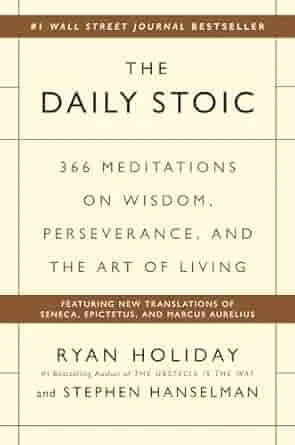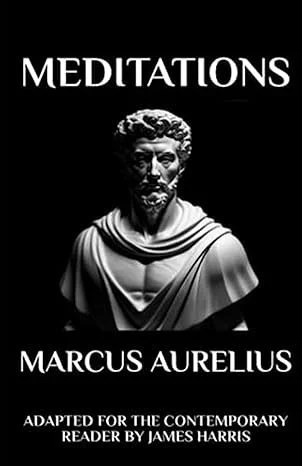Top 10 Books You Should Read This Winter 2025
Disclosure: As an Amazon Affiliate, I earn from qualifying purchases on the products shown below when purchased through the Amazon Link.
The Daily STOIC by Ryan Holiday
"The Daily Stoic" by Ryan Holiday is a practical guide to Stoicism, presenting daily readings and reflections inspired by ancient philosophy. Each entry comprises a passage from Stoic thinkers such as Marcus Aurelius, Seneca, and Epictetus, followed by insights and interpretations that make their teachings relevant to modern life.
The book is structured into 366 daily meditations, which not only provides a year-long journey but also emphasizes the timeless wisdom of Stoic philosophy. Holiday encourages readers to contemplate each day's message, integrating these lessons into everyday life to foster resilience, self-discipline, and clarity of thought.
Key themes in "The Daily Stoic" include the importance of perspective, the value of acceptance, and the practice of virtue. Holiday highlights that Stoicism is not about suppressing emotions but rather about understanding and channeling them constructively. This philosophy promotes a sense of tranquility and purpose, guiding individuals in navigating the complexities of contemporary existence.
In addition to its meditative approach, the book features practical exercises and journaling prompts that encourage deeper reflection. "The Daily Stoic" serves as both a philosophical guide and a tool for personal development, aimed at fostering a more deliberate and meaningful approach to life.
Overall, "The Daily Stoic" appeals to those seeking motivation and guidance through the lens of Stoic principles, offering a thoughtful framework for cultivating inner strength and resilience amidst life's challenges.
Available on Amazon’s Audible For A Limited Time Deal of ZERO DOLLARS! Also available for $2.99 on Amazon Kindle!
The Courage to Be Disliked: How to Free Yourself, Change Your Life, and Achieve Real Happiness
by Ichiro kishimi and Fumitake koga
"The Courage to Be Disliked," a collaborative work by Ichiro Kishimi and Fumitake Koga, delves into the philosophy of Alfred Adler, offering insights into how one can attain true happiness by embracing the courage to break free from societal expectations and relational constraints.
At its core, the book argues that our feelings of inferiority, the need for validation, and the pursuit of approval hinder our path to a fulfilling life. Instead of allowing external opinions to shape our self-worth, the authors encourage readers to focus on self-acceptance and personal responsibility.
Central to the narrative is the notion that happiness is not a destination but a choice we actively make. The discussions between the philosopher and the youth in the book illustrate the dichotomy between living for others and living for oneself. Readers are urged to confront their fears and start making changes that reflect their true desires, rather than conforming to the pressures imposed by society.
The concept of interpersonal relationships is also pivotal. The authors suggest that many issues stem from our attachment to how others perceive us. By learning to let go of the need for approval, individuals can foster healthier relationships built on mutual respect and understanding.
Ultimately, "The Courage to Be Disliked" serves as a reminder that achieving real happiness requires courage—courage to be authentic, to accept oneself fully, and to forge a life that aligns with one's true values. This work is an invaluable guide for anyone seeking to transform their perspective and embrace a more liberated and joyous existence.
Colorful Iris Apfel: A Celebrated Life in Fashion and Style
The book Colorful Iris Apfel delves into the life and career of Iris Apfel, a prominent figure in the fashion industry known for her unique aesthetic and vibrant personality. Celebrated for her distinctive style that blends high fashion with everyday wear, Apfel's influence extends beyond clothing; she represents a bold statement in self-expression and creativity.
This visually rich book features an array of photographs capturing Apfel's eclectic wardrobe, including her signature oversized glasses and vibrant accessories. It showcases not only her fashion choices but also her philosophy on style, which emphasizes individuality and the importance of self-confidence in expressing oneself through clothing.
In addition to highlighting her fashion career, Colorful Iris Apfel offers insights into her early life, her experiences as an entrepreneur, and her contributions to the design world. Apfel’s journey is illustrated through anecdotes and reflections that inspire readers to embrace their unique style and approach to life.
Through her work, Iris Apfel has redefined age in fashion, showcasing that creativity and passion know no boundaries. This book serves as both a tribute to her legacy and a source of inspiration for those seeking to cultivate their own personal style.
Behind the Blue Door by John Demsey
In "Behind the Blue Door," John Demsey invites readers into a world that embodies the essence of maximalism. This design philosophy emphasizes an abundance of colors, patterns, and textures, creating spaces that feel alive and vibrant. Demsey's work exemplifies how maximalism can transform ordinary environments into visually engaging experiences, challenging the minimalist trends that have dominated recent years.
Demsey's approach is characterized by his fearless juxtaposition of elements; eclectic art pieces, bold furniture choices, and diverse materials come together harmoniously. The aesthetic celebrates individuality and storytelling, urging homeowners and designers alike to express their unique tastes and preferences.
The book serves as both inspiration and a practical guide for those looking to incorporate maximalist designs into their spaces. Through rich imagery and thoughtful commentary, Demsey explores how to balance chaos with cohesion, encouraging readers to embrace the beauty of curated clutter.
One significant theme in "Behind the Blue Door" is the exploration of personal identity through design. Demsey illustrates how environments can reflect who we are at our core, highlighting the importance of personal narrative in the creation of meaningful spaces. Each room is approached as a canvas where personality and creativity can flourish.
"Behind the Blue Door" is more than just a design book; it is an invitation to break free from conventional styling and to delve deep into the expressive potential of maximalism. Demsey’s insights encourage readers to find joy in eclecticism, allowing their spaces to become authentic representations of their lives.
Forgotten Home Apothecary: 250 Powerful Remedies at Your Fingertips BY DR. NICHOLE APELIAN
Forgotten Home Apothecary serves as a comprehensive guide for individuals seeking to reconnect with traditional remedies and natural healing practices. Containing 250 powerful recipes, this collection focuses on herbal medicine, essential oils, and other holistic approaches that have stood the test of time.
The apothecary emphasizes the importance of understanding the properties of various herbs and plants. Each remedy is meticulously crafted, intended to address a range of ailments from everyday issues like headaches and skin irritations to more complex health challenges.
Herbal Recipes: A vast array of herbal formulations, including teas, tinctures, salves, and poultices, that promote wellness and vitality.
Essential Oil Guide: Detailed information on the extraction and use of essential oils, highlighting their therapeutic benefits and safe application methods.
Historical Context: Insight into the origins of these remedies, providing readers with a deeper appreciation for ancient practices that inform modern herbalism.
Sustainable Practices: A focus on sustainable sourcing and preparation methods encourages readers to cultivate their own herbal ingredients or procure them ethically.
Holistic Approach: Each remedy is contextualized within the broader framework of wellness, emphasizing the interconnectedness of mind, body, and spirit.
Forgotten Home Apothecary is not just a catalog of remedies; it is an invitation to explore the power of nature and reclaim the wisdom of the past. It empowers readers to nurture their health through accessible, effective, and natural means. For those looking to develop a deeper understanding of their health options, this book acts as a powerful resource at their fingertips.
The Let Them Theory By Mel Robbins
The "Let Them" theory by Mel Robbins emphasizes the importance of allowing others to experience their own emotions and challenges without interference. At its core, the theory suggests that individuals often feel compelled to intervene in situations to protect loved ones from discomfort or pain. However, Robbins argues that this well-intentioned instinct may hinder growth and resilience.
According to Robbins, by "letting them," we allow people to navigate their own feelings and learn from their experiences. This approach fosters personal responsibility and empowerment, encouraging individuals to develop coping mechanisms and problem-solving skills. The theory promotes the idea that discomfort is a natural part of life and that encountering challenges can lead to greater self-awareness and emotional strength.
Robbins provides practical strategies for implementing the "Let Them" theory. She suggests assessing situations to determine when to step back and when to offer support. This discernment is crucial, as enabling behaviors may ultimately prevent individuals from gaining valuable life lessons.
The "Let Them" theory advocates for a balance between support and autonomy, reinforcing the notion that people grow through their experiences. By embracing this philosophy, individuals can foster healthier relationships and contribute to a more resilient environment.
Atomic Habits by James Clear
"Atomic Habits" is a comprehensive guide that focuses on the transformative power of small, incremental changes over time. The central premise of the book is that making tiny adjustments to daily habits can lead to significant improvements in one’s life. James Clear emphasizes that it is not the scale of change that matters, but rather the consistency of these small habits.
The Four Laws of Behavior Change
Clear introduces a framework known as the Four Laws of Behavior Change to help readers understand how to effectively build good habits and break bad ones:
Make it Obvious: This first law highlights the importance of cues in habit formation. By making the triggers of good habits visible, individuals can create an environment that supports positive changes. Conversely, hiding cues for bad habits can be equally effective in reducing undesirable behaviors.
Make it Attractive: This law focuses on the psychological aspects of habits. Clear discusses the idea of temptation bundling, where individuals pair an action they want to do with an action they need to do, enhancing the appeal of the desired habit.
Make it Easy: Simplifying a behavior increases the likelihood of it being adopted. Clear encourages readers to reduce the friction associated with positive habits and increase the friction for negative ones. This practice emphasizes creating an environment that facilitates easy execution.
Make it Satisfying: The final law is about reinforcing habits through immediate rewards. Positive reinforcement solidifies the habit loop, making the desired behavior more likely to be repeated in the future.
The 1% Improvement
An essential concept in "Atomic Habits" is the idea of improving by just 1% each day. Clear argues that small gains accumulate, leading to remarkable results over time. By focusing on the compound growth of habits, readers can shift their perspective from goal-oriented thinking to a more process-oriented approach.
Identity-Based Habits
Additionally, Clear introduces the concept of identity-based habits, emphasizing that long-term change comes from changing one's identity rather than merely chasing specific outcomes. By aligning habits with desired identities, individuals can foster deeper motivation and sustain their efforts over time.
"Atomic Habits" serves as a practical guide for anyone looking to implement lasting change in their lives. Through actionable strategies and relatable examples, James Clear provides a structured approach to habit formation and transformation, empowering readers to take charge of their behaviors and achieve their aspirations. The book underscores that while the journey of habit change may be gradual, its impact can be profound.
Onyx Storm (Deluxe Limited Edition) by rebecca yarros
Onyx Storm is a captivating novel that explores themes of resilience, identity, and the intricate relationships between its characters. Set against a backdrop of both natural and personal turmoil, the story follows the journey of its protagonist as she navigates the challenges posed by external forces and her own internal struggles.
Varros' storytelling is marked by vivid descriptions and emotional depth, drawing readers into a world that is as tumultuous as it is enchanting. The title itself, "Onyx Storm," symbolizes both the beauty and intensity of the conflicting emotions experienced by the characters. The onyx stone represents grounding and strength, which plays a crucial role in the protagonist's journey toward self-discovery amidst chaos.
Throughout the narrative, Varros intricately weaves the lives of supporting characters, each adding layers to the central theme of finding one’s true self in the face of adversity. The interactions are crafted with an authenticity that resonates with readers, making the characters feel relatable and real.
With its engaging prose and multi-dimensional characters, Onyx Storm invites readers to reflect on their own experiences of overcoming challenges while maintaining a sense of hope and determination. The novel ultimately serves as a reminder of the strength that can emerge from the storms of life.
The Body Keeps the Score: Brain, Mind, and Body in the Healing of Trauma BY BESSEL VAN DER KOLK, M.D.
"The Body Keeps the Score" by Bessel van der Kolk, M.D., is a pivotal exploration of how trauma impacts individuals on multiple levels—physically, psychologically, and emotionally. Drawing on decades of research in the fields of psychiatry and neuroscience, the author illustrates how trauma reshapes the body and brain, influencing behavior and overall well-being.
Van der Kolk argues that traditional talk therapies often fall short in addressing the deep-seated effects of trauma. He emphasizes that trauma is not merely a psychological experience but also a physiological one. The book delves into the complex ways in which traumatic memories are stored in the body and how these memories can manifest through various symptoms, including anxiety, depression, and physical ailments.
Central to the text is the idea that healing requires a holistic approach. Van der Kolk discusses a variety of therapeutic options beyond conventional methods, including Eye Movement Desensitization and Reprocessing (EMDR), yoga, and neurofeedback. These approaches aim to integrate body awareness and facilitate a reconnection with one’s physical self as a means of recovery.
The book offers case studies and personal anecdotes that illustrate the profound effects of trauma on daily life. Van der Kolk highlights the importance of community and supportive relationships in the healing process, reinforcing the notion that recovery is often best achieved within a social context.
Ultimately, "The Body Keeps the Score" serves as a valuable resource for mental health professionals and individuals struggling with the long-term impacts of trauma. It provides insight into the complexities of the mind-body connection and underscores the significance of addressing trauma holistically in the path toward healing.
Meditations by Marcus Aurelius
"Meditations," written by the Roman Emperor Marcus Aurelius, is a seminal text in Stoic philosophy, originally penned in Greek during his military campaigns between 170 and 180 AD. It consists of personal writings reflecting his thoughts, beliefs, and practices aimed at attaining inner peace and resilience in the face of life's challenges.
The work is structured as a series of personal reflections, often addressing the self rather than a broader audience. This introspective nature conveys Aurelius' struggle to live a virtuous life in accordance with Stoic principles. Key themes include the importance of rationality, the acceptance of fate, and the recognition of the transient nature of life. Aurelius emphasizes the need to focus on what is within one's control and to maintain a sense of duty, empathy, and humility.
One of the central tenets of "Meditations" is the idea of living in accordance with nature and reason. Aurelius advocates for self-improvement and discipline, reminding readers that the mind’s turmoil often stems from within. His call to reside in the present moment serves as a timeless lesson on managing anxiety and the pressures of life's uncertainties.
Aurelius also reflects on the inevitability of death and the mutual connection of all individuals, encouraging a sense of universal citizenship. He articulates that every person has their own challenges, prompting a deeper compassion for others and a broader perspective on human experiences.
Through its pragmatic wisdom, "Meditations" has transcended its historical context, resonating with contemporary readers. It continues to serve as a guide for personal growth, encouraging individuals to cultivate resilience, practice mindfulness, and embrace the impermanence of life. The text remains a foundational work in the study of Stoicism, influencing countless thinkers, leaders, and everyday people seeking a balanced approach to adversity.
Disclosure: As an Amazon Affiliate, I earn from qualifying purchases on the products shown above.











